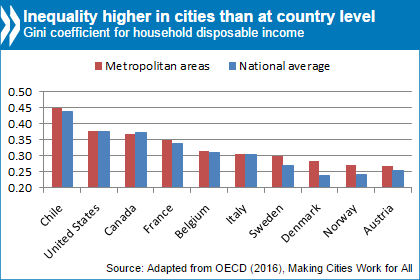Cities will become inequality traps without better housing, transport policies
Governments should rethink urban housing, transport, schooling and jobs strategies to ensure that cities do not become inequality traps, according to a new OECD report which shows that a majority of cities have higher inequality than their respective national average.

Making Cities Work for All: Data and Actions for Inclusive Growth, produced as part of the OECD’s All on Board for Inclusive Growth initiative with the support of the Ford Foundation, finds that cities in 9 out of 10 countries studied had higher levels of household income inequality than their respective national average. Using the Gini coefficient that rates inequality on a scale of 0 to 1, 63% of the cities studied had higher readings than the country average.
Rapid growth in the world’s cities, driven in part by unprecedented migration from rural areas in developing and emerging economies, means that by 2050 around 70% of humanity will live in cities, up from around half on 13 October. The data suggests that as cities get larger, they tend to become more unequal and thus could become drivers of inequality on a national level.
“Cities are incredible generators of growth and wellbeing, yet poor planning can turn them into inequality traps,” said OECD Secretary-General Angel Gurría, launching the report at the World Summit of Local and Regional Leaders in Bogota. “If we want to curb the global trend of rising inequality we must focus our efforts on cities and ensure that they work to the benefit of all.”
In advanced economies, cities have generated over 60% of jobs and economic growth in the past 15 years, and household incomes are on average 18% higher in cities than elsewhere. Yet not all cities have managed to grow inclusively, that is while engaging everyone in the process. Access to opportunities can stall for many low-income residents living in distressed neighbourhoods. The chances of success for children born into such areas are often tied to the socioeconomic status of their parents.
Looking at cities – defined as metropolitan areas with at least 500,000 inhabitants – in Austria, Belgium, Canada, Chile, Denmark, France, Italy, Norway, Sweden and the United States, Making Cities Work for All finds that in all countries with the exception of Canada the average inequality level is above the national average. Cities with the highest inequality in the countries studied include Bari (Italy), Brussels (Belgium), Calgary (Canada), Miami (United States) and Santiago (Chile).
When policies for urban housing and transport are poorly coordinated, they can increase segregation and restrict upward mobility for city dwellers. But smarter planning of public services can help lower-income households thrive in cities affected by sky-rocketing house prices. The report recommends that governments.
● Improve access to education with a particular focus on disadvantaged groups and increased investment in early childhood education. Establish vocational education and training programmes that match local needs.
● Invest in adult skills training and entrepreneurship, and encourage job creation in locally relevant industries.
● Better target housing allowances to make access to housing fairer and promote mixed-income neighbourhoods. Reduce regulatory barriers to homebuilding.
● Co-ordinate investment for urban housing and transport, and ensure that national and local policies for urban development support, rather than contradict, each other.
● Provide easier access to public services such as healthcare and develop urban regeneration strategies across the board.
Source: Organization for Economic Co-operation and Development
- 221 reads
Human Rights
Ringing FOWPAL’s Peace Bell for the World:Nobel Peace Prize Laureates’ Visions and Actions

Protecting the World’s Cultural Diversity for a Sustainable Future

The Peace Bell Resonates at the 27th Eurasian Economic Summit

Declaration of World Day of the Power of Hope Endorsed by People in 158 Nations

Puppet Show I International Friendship Day 2020

